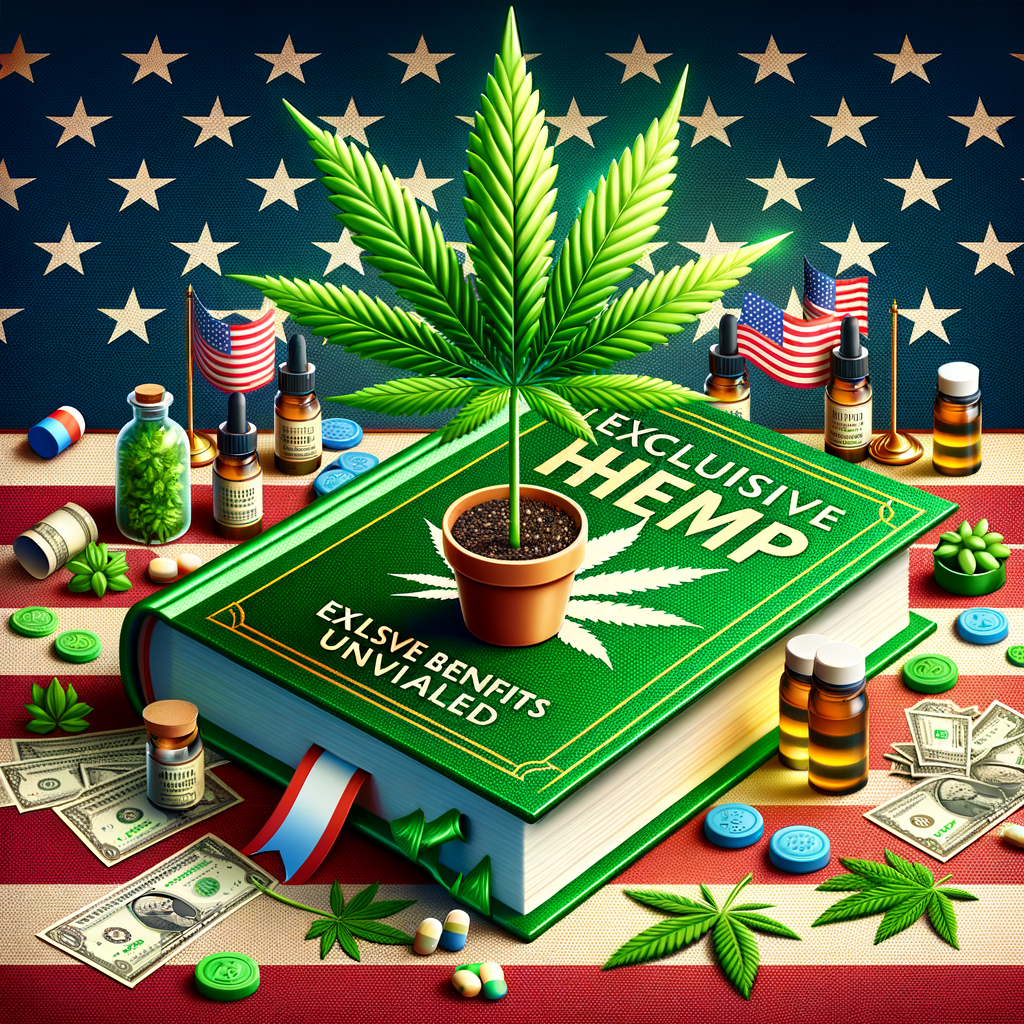
Hemp Legalization in the US: Exclusive Benefits Unveiled
- Understanding Hemp: A Brief Overview
- Economic Growth Through Hemp Agriculture
- Job Creation and Economic Opportunities
- Sustainable Farming Practices
- Versatility of Hemp Products
- Textile and Clothing Industry
- Construction and Building Materials
- Health and Wellness Advantages
- Pain Relief and Anxiety Management
- Nutritional Value
- Legal Framework and Compliance
- State Regulations
- Quality Control and Lab Testing
- The Future of Hemp Legalization
- Research and Development
- Public Awareness and Education
- Challenges Facing the Hemp Industry
- Market Saturation
- Stigma and Misconceptions
- Frequently Asked Questions
- 1. Is hemp the same as marijuana?
- 2. What are the main uses of hemp?
- 3. Is CBD derived from hemp legal?
- 4. Can I grow hemp in my state?
- 5. Are hemp seeds safe to eat?
- 6. How does hemp farming impact the environment?
- 7. Is there a risk of hemp poisoning?
- 8. What regulations exist for selling hemp products?
- 9. How can I start a hemp business?
- 10. What are future trends in the hemp industry?
- Conclusion
- References
Understanding Hemp: A Brief Overview
Hemp is more than just a trendy plant; it’s gaining traction as a powerhouse in various industries. Hemp and marijuana come from the same species, Cannabis sativa, but they differ significantly in their chemical composition. Hemp contains very low levels of THC, the compound responsible for the psychoactive effects associated with marijuana. This distinction is crucial, as it sets the stage for legal regulations and practical applications.
In recent years, hemp legalization in the U.S. has opened up new avenues for farmers, manufacturers, and consumers alike. With the passing of the Farm Bill in 2018, hemp became federally legal, allowing farmers to cultivate it without fear of legal repercussions. This shift not only uplifts agricultural practices but also alters the landscape of industries like textiles, construction, and even food.
Understanding these differences and the significance of hemp legalization helps clarify why it’s making headlines. People are waking up to the plant’s vast potential, and this article aims to detail the exclusive benefits that come along with its legalization.
Economic Growth Through Hemp Agriculture
One of the most immediate benefits of hemp legalization is its positive impact on the agricultural sector. Farmers throughout the nation see a new opportunity to diversify their crops. The U.S. is known for its agricultural bounty, and adding hemp to the mix can lead to increased profitability.
Job Creation and Economic Opportunities
The hemp industry generates numerous jobs across different sectors. Farmers need labor to cultivate the plant, which creates agricultural jobs. Moreover, processing facilities require workers, and retailers depend on staff to sell hemp-derived products. All these aspects contribute to economic growth.
A report by Hemp Business Journal estimates that the hemp industry could grow to $26.6 billion by 2025. This growth indicates that hemp can serve as a significant economic driver. With new job opportunities and increased income for farmers, the benefits extend beyond just profits—they cultivate economic resilience.
Sustainable Farming Practices
Hemp is an environmentally friendly crop. It grows quickly and requires less water compared to traditional crops like cotton. It has a profound ability to regenerate soil. Not only does this crop improve soil health, but it also contributes to diverse farming ecosystems. By diversifying crops, farmers enhance resilience against climate change.
Additionally, hemp absorbs carbon dioxide, making it a formidable ally in the fight against global warming. This aligns with the increasing demand for sustainable agricultural methods. Legalization helps promote eco-friendly practices while supporting farming communities.
Versatility of Hemp Products
Hemp’s versatility is mind-boggling. The plant serves multiple purposes, and the legalization has revealed even more possibilities. From textiles to food and biofuels, the applications are vast and varied.
Textile and Clothing Industry
Hemp fibers produce durable textiles. Many fashion brands are now incorporating hemp into their lines. This switch not only helps create sustainable clothing but also fosters eco-friendly production methods. Hemp fabrics tend to be more durable than cotton. This means consumers get long-lasting products and contribute to a more sustainable textile industry.
Construction and Building Materials
Hemp also plays a pivotal role in the construction industry. Hempcrete, a biocomposite material made from hemp fibers, serves as a sustainable alternative to traditional concrete. This material is lightweight and contributes to energy efficiency in buildings. Furthermore, it has excellent insulation properties, reducing energy consumption in homes.
Other building materials like hemp-based insulation, flooring, and fiberboards are on the rise. These eco-friendly products offer durability and sustainability, allowing builders to invest in greener construction methods.
Health and Wellness Advantages
Legalization opens doors for health benefits associated with hemp-derived products, particularly CBD oil. Cannabidiol (CBD) has gained immense popularity in recent years for its therapeutic properties. Unlike THC, CBD does not produce a psychoactive effect, making it a safer alternative for many users.
Pain Relief and Anxiety Management
Many people are turning to CBD for pain relief and anxiety management. Studies suggest that CBD can help alleviate chronic pain and reduce anxiety levels. The growing body of research backs these claims, making hemp-derived products an appealing option for those seeking natural remedies.
Additionally, CBD’s anti-inflammatory properties can benefit not just individuals but entire communities. By offering natural alternatives to conventional pharmaceuticals, hemp could transform the healthcare landscape.
Nutritional Value
Hemp seeds are nutritional powerhouses packed with essential fatty acids, proteins, and vitamins. They offer a complete source of protein, making them particularly appealing for vegans and vegetarians. Including hemp seeds in diets can enhance overall health.
Moreover, hemp oil, derived from the seeds, carries cardiovascular benefits. It promotes heart health due to its optimal omega-3 to omega-6 ratio. As more people learn about these nutritional advantages, the demand for hemp products will likely soar.
Legal Framework and Compliance
Understanding the legal framework surrounding hemp is essential for anyone interested in this industry. Although hemp is federally legal, specific regulations still govern its cultivation, processing, and sale.
State Regulations
Each state can impose its regulations, which may differ from federal guidelines. Some states may have stricter requirements for cultivation and processing, while others may allow more freedom. Farmers and businesses must stay updated on these regulations to ensure compliance and optimize operations.
It’s crucial for individuals interested in entering the hemp market to conduct thorough research. They should consult local authorities and industry experts to navigate the landscape effectively.
Quality Control and Lab Testing
Quality control is another significant factor in the hemp industry. Businesses must ensure their products meet safety standards, especially in the health and wellness sectors. Lab testing for THC levels and contaminants is essential for consumer safety. Transparency builds trust among consumers, who increasingly prioritize quality when purchasing hemp-derived products.
The Future of Hemp Legalization
Looking ahead, the future of hemp legalization in the U.S. appears promising. With growing interest from consumers and businesses alike, innovation will likely accelerate. Entrepreneurs will continue to explore new applications, from pharmaceuticals to sustainable packaging solutions.
Research and Development
The legalization of hemp encourages a surge in research and development. Universities and institutions are beginning to fund studies focusing on optimizing hemp production and exploring new uses. This can lead to breakthroughs that make hemp even more beneficial.
Investing in research will provide the U.S. with a scientific understanding of hemp’s potential. This not only aids existing industries but also positions the nation as a leader in hemp innovations globally.
Public Awareness and Education
As more people learn about the benefits of hemp, public awareness will grow. Education will play a crucial role in this process. Informing consumers about the different products available helps demystify hemp. This, in turn, helps foster a more informed and engaged consumer base.
Through community workshops and educational programs, we can promote responsible consumption and safe practices. Public understanding of hemp will contribute to a growing and sustainable industry.
Challenges Facing the Hemp Industry
While the benefits are substantial, the hemp industry faces its share of challenges. Understanding these hurdles is important for anyone considering a stake in the market.
Market Saturation
As the hemp industry grows, market saturation is a risk. Many farmers are joining the hemp bandwagon. This influx can lead to oversupply, pushing prices down and making profitability a concern. Farmers need to educate themselves on market trends and cultivate crops accordingly.
Stigma and Misconceptions
Despite its legalization, stigma still surrounds hemp, particularly its association with marijuana. Many individuals remain confused about the plant and its uses. Overcoming this stigma requires continuous education and outreach.
Efforts to clarify the differences between hemp and marijuana are critical. Educators and advocates must work together to ensure consumers receive accurate information.
Frequently Asked Questions
1. Is hemp the same as marijuana?
No, hemp and marijuana are different varieties of the Cannabis sativa plant. Hemp contains less than 0.3% THC, while marijuana has higher THC levels.
2. What are the main uses of hemp?
Hemp can be used for textiles, construction materials, food items, health products, and biofuels.
3. Is CBD derived from hemp legal?
Yes, hemp-derived CBD is federally legal in the U.S. as long as it contains less than 0.3% THC.
4. Can I grow hemp in my state?
It depends on state regulations. While hemp is federally legal, each state may have its own restrictions on cultivation.
5. Are hemp seeds safe to eat?
Yes, hemp seeds are generally safe to eat and are rich in nutrition.
6. How does hemp farming impact the environment?
Hemp farming is beneficial for the environment as it requires less water, regenerates soil, and absorbs CO2.
7. Is there a risk of hemp poisoning?
Hemp products are generally safe, but it’s always wise to purchase from reputable sources that conduct lab testing.
8. What regulations exist for selling hemp products?
Regulations can vary by state. Businesses must ensure that their products meet federal and state safety requirements.
9. How can I start a hemp business?
Research your local regulations, develop a business plan, and consult industry experts to ensure compliance and optimal operations.
10. What are future trends in the hemp industry?
Future trends may include innovations in hemp-based products, more research in health applications, and expanded agricultural practices.
Conclusion
Hemp legalization in the U.S. marks a significant shift towards economic growth, enhanced sustainability, and improved health options. The exclusive benefits it brings cannot be overstated. As public awareness increases and research expands, the future of hemp appears brighter than ever. The journey is just beginning, and both individuals and businesses stand to gain from this versatile crop.
References
1. Hemp Business Journal
2. National Hemp Association
3. U.S. Department of Agriculture – Hemp Production
4. The Future of Hemp – Forbes
5. Health Benefits of Hemp Seeds – Healthline

